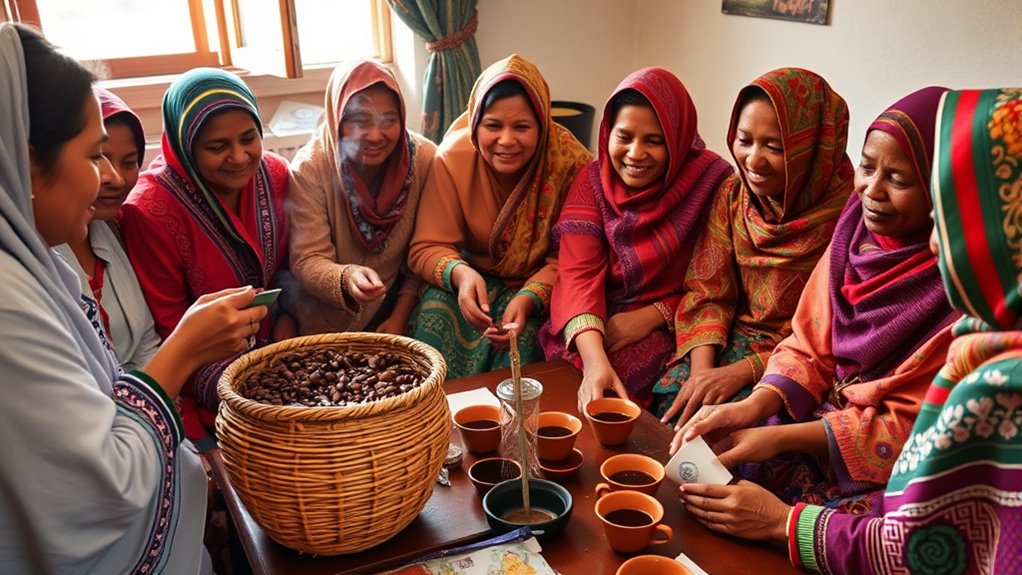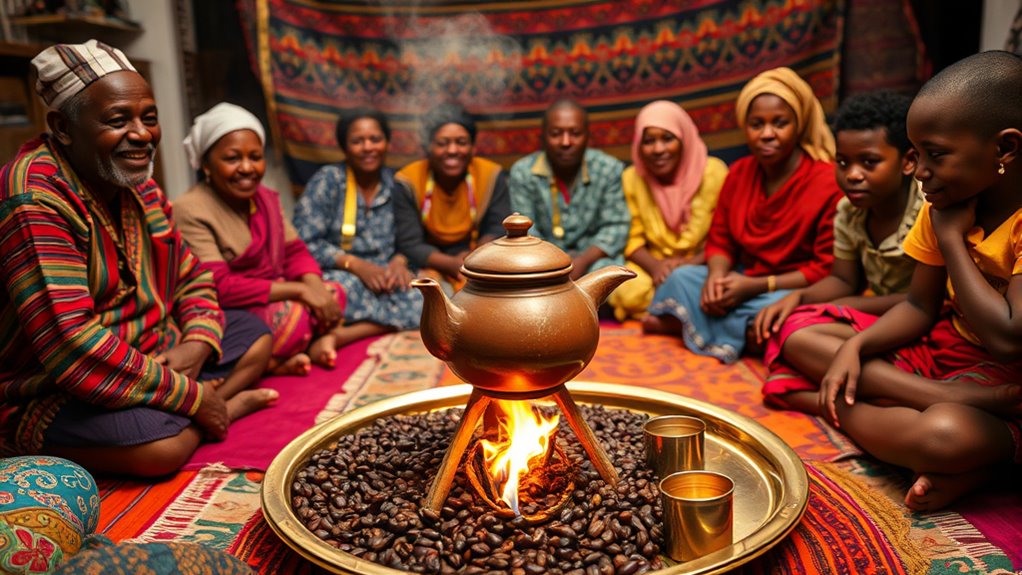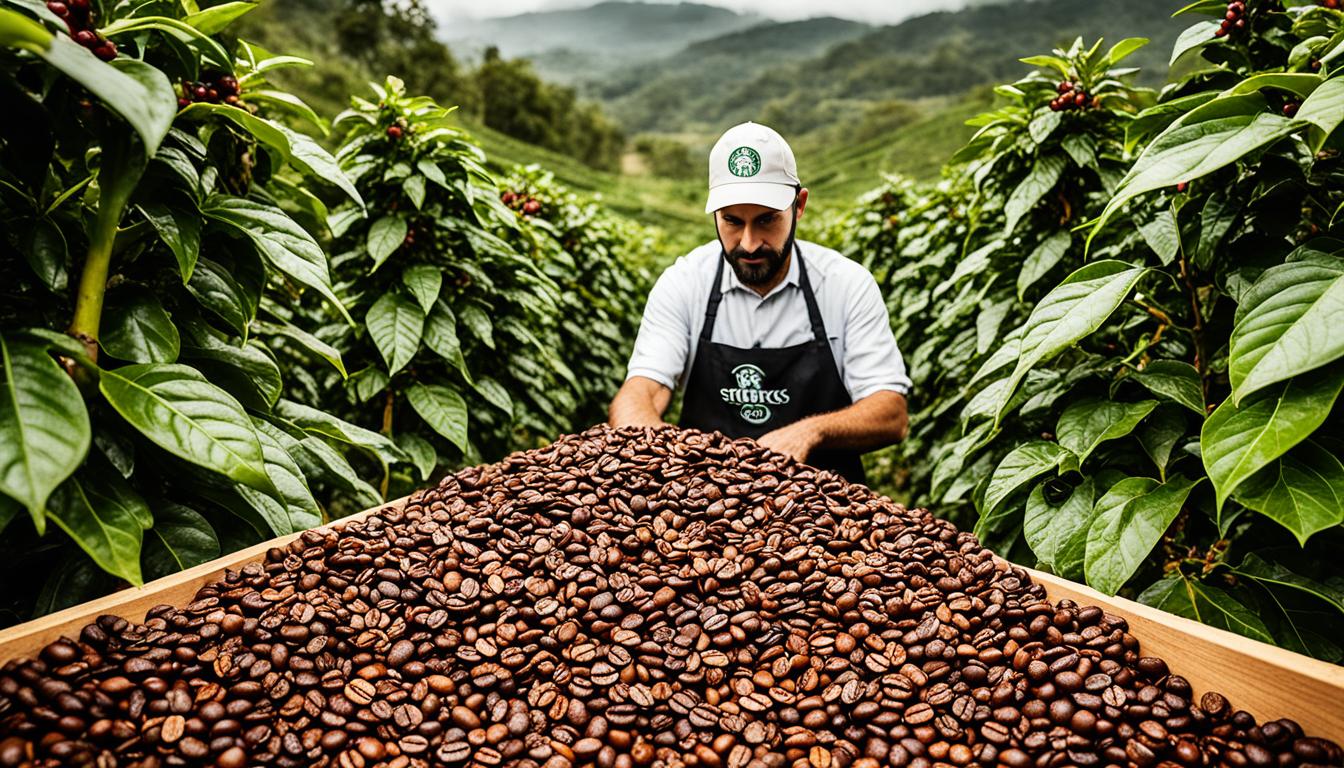The Ethiopian Coffee Ceremony is more than just making coffee; it’s a warm, communal experience that brings people together. You’ll participate in a tradition that emphasizes patience, respect, and connection, from selecting fresh beans to sharing a cup served with care. Each step, from roasting to pouring, fosters conversation and strengthens bonds. If you continue exploring, you’ll discover how this ancient ritual celebrates community and cultural pride in every cup.
Key Takeaways
- The Ethiopian Coffee Ceremony is a vital social tradition that fosters community, connection, and hospitality among participants.
- It involves a careful process of selecting, roasting, and grinding coffee, emphasizing patience and mindfulness.
- Brewing with a traditional jebena symbolizes unity and shared cultural values during communal gatherings.
- Serving coffee with specific customs and snacks enhances social bonds and demonstrates respect and generosity.
- The ceremony transforms coffee into a meaningful ritual that strengthens relationships and reinforces Ethiopian cultural identity.

The Ethiopian Coffee Ceremony is a cherished tradition that brings people together to enjoy freshly brewed coffee in a warm, communal setting. When you participate in this ritual, you become part of a social tradition that has been passed down through generations. The process of coffee preparation is more than just brewing; it’s an art that emphasizes patience, respect, and connection. You start by selecting high-quality green coffee beans, often roasted right in front of you to *release* their full aroma. As the beans turn a rich, dark brown, you’ll notice the fragrant scent filling the air, signaling that the time to grind is near. You then grind the coffee using a traditional mortar and pestle, which helps preserve the beans’ essential oils and enhances the flavor. This step isn’t hurried; it’s a mindful act that invites you to slow down and appreciate the moment.
Once the coffee is ground, you add it to a special vessel called a jebena—an essential tool in the coffee preparation process—which is traditionally made of clay. You pour water into the jebena and bring it to a gentle boil over an open flame. As the coffee brews, you watch the mixture bubble and foam, a sign that it’s ready to be served. The act of brewing coffee in this manner embodies the social tradition that makes the Ethiopian Coffee Ceremony so meaningful. It’s not just about the drink itself but about the ritual of sharing it with others. You might invite friends or family to gather around, creating a sense of community with each step, from roasting to pouring. Additionally, understanding the size restrictions for tiny houses can help you plan your space efficiently and ensure compliance with local regulations, which is crucial for any construction project.
Furthermore, the ceremony often includes specific customs or etiquette, such as serving the coffee with a particular gesture or in a certain order, which enhances the sense of tradition and respect among participants. When the coffee is finally poured into small cups called finjan, you’re encouraged to serve it with care and respect, often accompanied by a snack like popcorn or roasted grains. The pouring itself is deliberate, allowing the coffee to flow smoothly into each cup, symbolizing generosity and unity. As you sip the fragrant brew, conversations flow naturally, and everyone feels more connected. This social tradition emphasizes hospitality, patience, and attentiveness—values that are woven into the very fabric of Ethiopian culture. Every cup becomes a shared experience that nurtures relationships and celebrates community. Participating in the Ethiopian Coffee Ceremony reminds you that coffee is more than a beverage; it’s a vessel for social bonding and cultural identity.
Frequently Asked Questions
How Has the Ethiopian Coffee Ceremony Evolved Over Centuries?
You see, over centuries, Ethiopian coffee preparation has evolved while maintaining its ritual significance. Originally, it was a simple social activity, but now, modern methods blend tradition with new techniques. Despite changes, the ceremony still emphasizes community and respect, with each step—roasting, brewing, serving—carrying cultural meaning. You’re invited to experience this rich tradition, where every cup fosters connection and preserves the timeless essence of Ethiopian hospitality.
What Are the Regional Variations in the Coffee Ceremony Across Ethiopia?
Imagine strolling through Ethiopia, where regional customs shape each coffee preparation. In the highlands, you notice a focus on roasting beans over open flames, while in the lowlands, spices are added to create unique flavors. Each area brings its own traditions, from the way coffee is brewed to how it’s served. These regional variations highlight Ethiopia’s rich cultural diversity, making every coffee ceremony a distinct and memorable experience.
How Does the Ceremony Reflect Ethiopia’s Cultural Diversity?
You see how the coffee ceremony reflects Ethiopia’s cultural diversity through its unique ritual traditions and coffee symbolism. Each region adapts the ceremony to its customs, showcasing varied rituals that honor local history and beliefs. This vibrant diversity highlights Ethiopia’s rich heritage, uniting communities through shared practices. By participating, you experience how these ritual traditions symbolize unity and identity, emphasizing the importance of coffee in fostering social bonds across different cultures within Ethiopia.
What Is the Significance of Specific Herbs or Additives Used?
Imagine a symphony where each herbal infusion and traditional spice adds a unique note, enriching the coffee’s aroma and flavor. You’ll find herbs like cardamom and cloves, which symbolize warmth and hospitality, blending seamlessly into the brew. These additives carry cultural significance, representing blessings, health, and tradition. Their presence transforms a simple cup into a sacred ritual, connecting you to Ethiopia’s rich heritage with every sip you take.
How Is the Coffee Ceremony Adapting to Modern Urban Lifestyles?
You’ll notice that modern coffee trends are shaping urban social rituals, making traditional ceremonies more flexible. As city life speeds up, people adapt by incorporating contemporary brewing methods like pour-over or espresso, while still valuing the communal aspect. Coffee shops become social hubs, blending tradition with innovation. This evolution helps keep the spirit of the ceremony alive, fostering connection even amid busy urban lifestyles.
Conclusion
As you experience the Ethiopian coffee ceremony, remember that over 15 million Ethiopians participate daily, turning each cup into a shared moment of community. This tradition isn’t just about coffee; it’s about connection, hospitality, and culture. In every sip, you’re part of a rich heritage that has lasted for centuries. So next time you enjoy coffee, think of Ethiopia’s vibrant gatherings where every cup brings people closer together.









